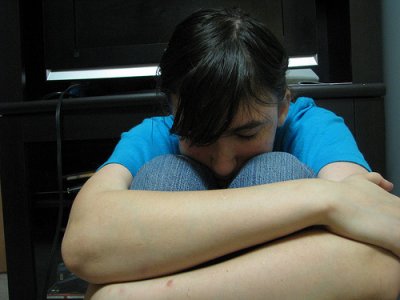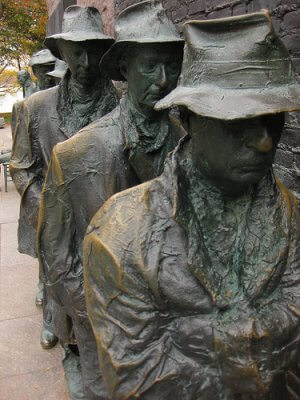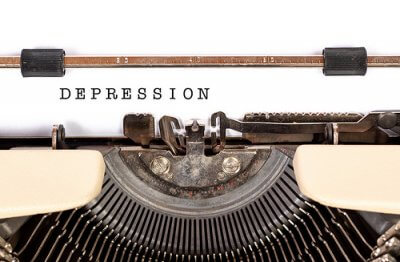How to Know if You Are Depressed? 12 Questions to Ask
by Andrea M. Darcy
Not feeling yourself lately? Worried you might have depression? And wondering how to know if you are depressed?
Depression has a wide range of symptoms. And there are even different kinds of depression. So if you are seriously concerned, it’s of course best to see a mental health professional.
This said, there are certain questions you can ask that can give you a clearer picture over whether it’s depression, or something else entirely.
[Have you taken our ‘Stressed, Depressed, or Both?’ quiz yet? It’s free!]
How to know if you are depressed – 9 questions to ask
So what is it you need to ask?
1. How long have you been feeling low?
Is it only recently you’ve not felt yourself? Like in the last few weeks? And is this unusual for you, or are you constantly having ups and downs?
If you’ve only felt blue for a few weeks or more, it could be a bout of sadness or emotional shock.
Depression comes when we’ve not felt ourselves for around six weeks, or up to a lot longer.
Look at the big picture here if you tend to have ups and downs. If you have two or three weeks of feeling low each month, and it’s been going on for half the year, then you are really looking at a six-month period. It’s time to reach out for help.
[Know you are depressed, but scared to go to a therapist’s office? Why not try online therapy from the comfort of your own home?].
2. How interested are you in your hobbies and activities?

By: Megadeth’s Girl
Crying a lot, but still making it to the gym, and happy to get out to see friends as then you feel better? You are more likely just processing some sadness.
Depression actually affects our capacity to want to do things we usually like. Everything seems too much effort to be bothered.
3. Do you know what’s behind your moods?
Did you have a bad experience a few weeks ago, like a redundancy, a break up, or a presentation gone wrong? You might be suffering severe stress.
The good thing about stress, unlike depression, is that we can identify the issue and therefore take steps to fix it. We can get help with a new CV, spend time with friends, or take a course in public speaking.
Depression, on the other hand, can descend like a blinding fog. There were many things going on, and then suddenly we were just ‘in it’. We feel helpless against depression because we can rarely pinpoint the exact cause. So we don’t know where to start making changes (and depression robs us of the motivation to even try).
Note that stress can, however, become depression if we don’t deal with the stressor. So do seek support to make a plan forward.
4. What tense is your mind living in?
How to know if you are depressed? Note if your thoughts are about the past, present, or future.
Are you obsessed with something in the future, and unable to stop thinking about all the things that might go wrong? You are more likely to be suffering anxiety than depression.
Depression can blot out any hope for a future. Instead we obsess on the past. All the things that went wrong in our life, that we missed out on, all the ways we failed.
5. What is the main emotion you feel lately?

By: Robert Hoge
Do you feel fear jolt through your body on a daily basis? Again, that is anxiety, a fear-based condition.
Depression is more likely to drown you in shame. Shame can manifest as waves of guilt, sadness, and even blasts of anger.
Note that sometimes, with depression, you can find you are unable to feel at all, lost in what many depression sufferers refer to as ’emotional numbness’.
6. What are your physical symptoms?
Muscle tension, churning stomach, sweaty palms, heart palpitations? These are symptoms of stress or anxiety.
So exhausted everything seems a giant effort? Does your body feel made of sand or lead? Or do you feel flu-y all the time, run down? Or even disconnected from your body entirely? These can be the physical symptoms of depression.
7. And how is your sleep?
Are you sleeping so heavily you can’t get up when the alarm clock goes, and are suddenly prone to sleeping away your weekends? Or, are you sleeping in fits and starts, having bad dreams, waking up tired? Or unable to fall asleep at all? Depression tends to cause sleep problems.
Anxiety also affects sleep. Either you can’t sleep at all as your mind is racing, or you wake up several times with night anxiety, which feels like a half-asleep panic attack in the dark.
8. And your appetite?
Depression can mean we under or overeat.
9. What are you thinking about?

By: Ganesh Dhamodkar
If you take the time to hear your thoughts, what do you hear?
Are you going through details of everything you have to do and accomplish, and troubleshooting? It’s stress or anxiety.
Are you replaying a certain situation again and again, trying to get the facts right but feeling emotional? Might just be sadness and a bit of emotional shock.
If your thoughts are all doom and gloom, then you might have depression.
Negative thinking is always present with depression, as are ‘cognitive distortions‘, where we make things worse than reality. If you have severe depression, your negative thinking will be so bad you can even consider hurting yourself or others.
If this is you, seek help immediately – try a free help line, or, if you really are about to carry through, call emergency services.
10. Who are you thinking about?
Are you thinking about what your boss thinks of you, and your colleagues, and your family? Wondering how they will react to what you do next? Anxiety, always looking outward, has a hold on you.
Do you think about yourself mostly, about all the things you do wrong, and the terrible things that you experienced? If you are thinking about others, is it about how you let them down, and how they can’t understand you? This could be depression talking, an inward-looking condition.
11. How’s your focus?
When you try to work, does your mind feel foggy, blank, far away? Is it hard to get simple tasks done, partly as you can’t focus, partly as you can’t find the desire to be bothered to focus? Sounds like depression.
Stress and anxiety, on the other and, put us into the fight and flight mode. Our cortisol levels surge and we can find that we are sharply over-focused, as if we are seeing in 3D.
12. Do you feel understood?
Do you feel inclined to share the way you are feeling and thinking with friends and loved ones? Even find yourself over-explaining it? Anxiety can make us babble. And we are more likely to share it, as we live in a society where anxiety and stress are fairly acceptable.
Depression can have to opposite effect. It goes back to the fact that depression is driven by shame. And when we have shame, our instinct is to hide.
Even if we do gather our courage and share how bad we are feeling with a loved one, shame can cause us to be on the lookout for the tiniest glimmer of rejection. No matter how hard the other person tries, if we are depressed, we are likely to feel misunderstood.
Will my depression just go away?
Depression doesn’t tend to vanish, even if we have a sudden change of life circumstance for the positive. This is because depression is driven by unresolved past experiences that affect our unconscious and colour our ability to enjoy good things. But trying talk therapy can mean we not only manage our depression, we are less likely to fall into it again in the future.
Time to seek help for depression and finally get your life back on track? We connect you to some of London’s top therapists. Not in London, or even the UK? Our booking platform offers registered therapists UK-wide, or Skype therapists you can talk to from anywhere.
 Andrea M. Darcy is a mental health and wellbeing expert, who has done some training in person-centred counselling and coaching. She often writes about trauma, relationships, and ADHD, and advises people on how to plan their therapy journey. Find her on Instagram @am_darcy
Andrea M. Darcy is a mental health and wellbeing expert, who has done some training in person-centred counselling and coaching. She often writes about trauma, relationships, and ADHD, and advises people on how to plan their therapy journey. Find her on Instagram @am_darcy






This is good article, thank you
Glad to be of help!
Thank u, this has made me realize that I have depression…And I need to get something done with it I hate being like this I want my old self back! I want my goofy Side back.